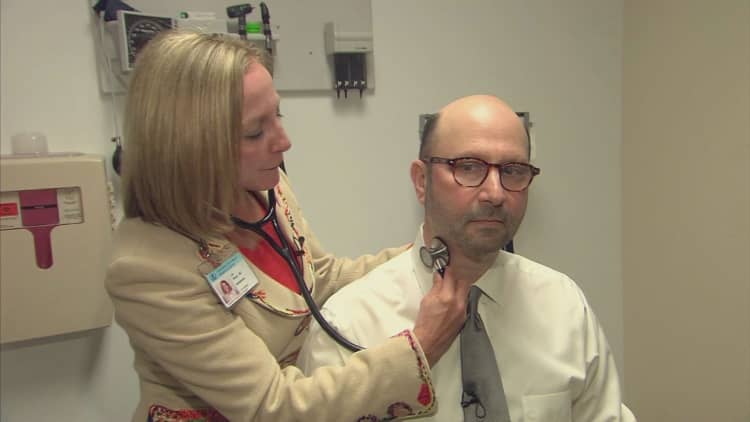It's the holiday season, and they're counting who's been naughty, who's been nice — and who could lose their Obamacare soon.
Two new reports out this week offer fresh details about the millions of people who have benefited from the expansion of health coverage under the Affordable Care Act, and who are at risk of losing it under President-elect Donald Trump if he seeks repeal of the ACA as planned.

Both reports come from researchers at the Urban Institute, which has been assembling a slew of data as potential ammunition for Obamacare defenders next year — when the Republican-controlled Congress is expected to push for a repeal-and-replace plan for the ACA.
The data underscore the potential political fallout that Trump and his fellow Republicans could face if their ultimate replacement plan leads to significant decreases in the number of Americans with health insurance coverage. Those Americans include millions of kids who have become insured via Obamacare programs.
One report found that 19.2 million nonelderly adults gained health insurance from 2010, when the ACA first began having some effect, up to 2015.
"A large majority (87 percent) of adults gaining coverage from 2010 to 2016 did not have a college degree," said that report, which was conducted with assistance from the Robert Wood Johnson Foundation.
And 8.2 million or them, or 43 percent, were non-Hispanic whites.
Among voting groups, whites and people without college degrees were more likely to support Trump in the presidential election than they were to cast their ballot for his Democratic opponent, Hillary Clinton.
About 6.2 million adults who gained coverage under Obamacare were Hispanics. Another 2.8 million were black non-Hispanics. The remaining 2 million were other non-Hispanics, the report said.
The institute has previously estimated that a total of 30 million people could lose health coverage if Obamacare was partially repealed — which would include defunding subsidies for individual insurance plans — without replacement legislation also being implemented.
That tally is higher than the 19.2 million who gained coverage under the ACA because it reflects, among other things, what is projected to be a near-total collapse of the individual insurance market.
The other Urban Institute report released this week focused on the coverage implications for parents and children if there were to be a "partial repeal of the ACA" through a process known as reconciliation.
Congress, by a simple majority vote, can pass without threat of a filibuster a budget measure, such as one that would defund key parts of Obamacare. Opponents of Obamacare are prepared to use that method early next year to do just that.
The Urban institute looked at several potential scenarios for estimating the effect of repeal on kids.
The first scenario examined partial repeal without a replacement plan. Although Congress could easily repeal funding for key Obamacare programs, it is not clear that Republicans will be able to obtain what likely will be needed Democratic support for a replacement plan for the ACA — even if the repeal is suspended for several years.
Under that scenario — one with no replacement — the number of uninsured children in 2019 would be 4.4 million greater than it would be under the ACA, the Urban Institute report said.
The number of uninsured parents would be 7.6 million greater, the report found. That would raise the uninsured rate for adults from a projected 10.7 percent under the ACA to 22.8 percent.
The second scenario examined was one involving partial repeal, combined with a previous Republican proposal that could lead states to lower the eligibility limits for children to be covered under Medicaid, the government-run program for the poor.
Under that scenario, nearly 9 million kids would be at risk of losing coverage, the report found.
House Speaker Paul Ryan, R-Wis., and other congressional Republicans have said they intend for a transition period between votes to repeal Obamacare and implementation of a replacement plan, a period that would maintain current levels of coverage for people who have benefited from the ACA.
But the American Academy of Actuaries, whose members help set the prices for Obamacare health plans, warned earlier this month that if the creation and adoption of the plan is delayed, it could wreak havoc on the individual health insurance plan market, where more than 12 million people have coverage.
The academy, in a letter to Ryan, said that insurers could flee the individual market because of uncertainty over its long-term prospects, and that premium rates could soar to unaffordable levels for many customers.
The chance that could happen, and the scenarios outlined by the Urban Institute and others, has worried state governors.
Earlier this week, New Mexico Gov. Susana Martinez, a Republican, wrote several GOP House members to warn that repeal without a replacement plan "could cause considerable harm" to her state's residents, Politico Pro reported.
The Democratic Governors Association on Wednesday wrote Ryan and Senate Majority Leader Mitch McConnell saying that in addition to potentially 30 million people losing insurance if Obamacare is repealed, states may also be hit with almost $69 billion in costs from so-called uncompensated care over the next decade.
Uncompensated care is medical treatment provided to people who are not insured. State funding to hospitals and other providers for uncompensated care has decreased as a result of coverage expansion under the ACA.


